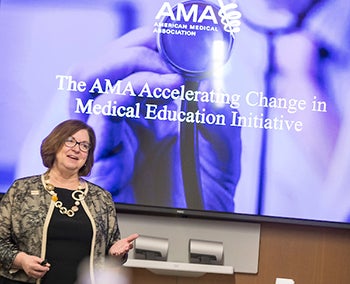BRODY RECEIVES NATIONAL PRAISE
ECU’s Brody School of Medicine praised as ‘inspiration for national program change’

Dr. Susan Skochelak, AMA’s group vice president for medical education, speaks during a visit to Brody School of Medicine.
In 2013, 80 percent of the nation’s medical schools applied for grant funding through the American Medical Association’s Accelerating Change in Medical Education initiative.
East Carolina University’s Brody School of Medicine was one of only 11 medical schools nationwide to be awarded a five-year, $1 million grant under the AMA program, which aims to bridge the gap between how future physicians are trained and how health care is delivered.
On Thursday, during their final visit to ECU as part of the initial consortium, AMA leadership praised Brody for being a national leader in transforming medical education and improving the health care system.
“You’ve been an inspiration for national program change,” Dr. Susan Skochelak, AMA’s group vice president for medical education, told Brody administrators, faculty and students during the visit.
“The health care system has been broken for a while in ways where we need physician leaders and nurse leaders to say ‘the system can be fixed and here are ways that we can fix it.’ This is what Brody has been bringing to medical education that wasn’t there before,” Skochelak added. “It is, at a very practical level, giving people tools to close gaps that we think are important in the health care system. And Brody School of Medicine has been at the forefront as a leader in this area.”
The host of innovations that grew out of Brody’s grant funding included:
- Development of a longitudinal curriculum in health system science focusing on developing skills related to patient safety, quality improvement, systems science, population health and interprofessional team-based care.
- Creation of the nationally recognized Teachers of Quality Academy, a year-long faculty development program that has thus far trained 78 medical, nursing and allied health faculty members in new health science competencies.
- Creation of the Leaders in INnovative Care (LINC) Scholars program, which leads to graduation with distinction in health system transformation and leadership for a small group of competitively selected medical students. The inaugural cohort of five LINC scholars will graduate in May.
“This is the culmination of work we’ve been doing since 2013 with the

ECU health sciences faculty members participate in a team-building activity during a Teachers of Quality Academy session.
support of the AMA and the Accelerating Change in Medical Education program,” said Dr. Elizabeth Baxley, Brody’s senior associate dean for academic affairs. “The team at Brody has worked really hard over the last five years and has made an enormous commitment to changing medical student education and changing faculty training. So we were very pleased to have the AMA recognize the work that we were doing in this space.”
Dr. Mike Waldrum, chief executive officer of Vidant Health, said Brody’s incorporation of health system science training into its curriculum could be “transformational to the health care industry.”
“It will be an incredible asset to Brody, because we’ll be producing students that the industry needs and wants, and that aren’t being produced anywhere else,” Waldrum said. “From a system perspective, having physician leaders that understand health system science and can help the organization improve is what we all want. So it’s a great thing for Brody School of Medicine and for delivery organizations, and I think that it’s going to continue to propel Brody’s reputation and ECU’s reputation.”
Dr. Gerald Harmon, chairman of the AMA’s board of trustees, said the AMA “got it right” by choosing to invest in Brody.
“We’re not only looking at a transformational way to deliver health care, we’re looking at reducing the cost of care and the burden of economic drain on our system,” Harmon said. “This is an investment on the cost of care and on the quality of the value-based payment system of the future. Brody is obviously one of the leaders, that’s why it’s being recognized nationally.”
The first class of Brody students to receive all of their training under the new curriculum is set to graduate in May.
Taj Nasser, a fourth-year medical student and LINC Scholar, said the program made a tremendous impact on the quality of his education and the quality of care he will be able to provide his patients.
“As a future physician, I will not only be able to provide clinical care for my patients, but also help improve the system that physicians work in and improve the quality of care that patients receive,” Nasser said. “We’re learning how to make a big impact on the health system in general, which is very exciting.”
